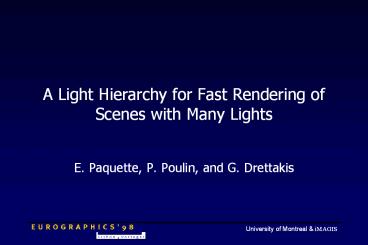A Light Hierarchy for Fast Rendering of Scenes with Many Lights
Title:
A Light Hierarchy for Fast Rendering of Scenes with Many Lights
Description:
Diffuse and specular shading. Treating visibility. Conclusion & future work ... Specular Reflection ... Specular Reflection Shading. HierShading(Point p, Voxel ... –
Number of Views:41
Avg rating:3.0/5.0
Title: A Light Hierarchy for Fast Rendering of Scenes with Many Lights
1
A Light Hierarchy for Fast Rendering of Scenes
with Many Lights
- E. Paquette, P. Poulin, and G. Drettakis
2
Motivation
- Scenes with many light sources are expensive to
render - Shading and shadowing cost dominates
- Typical scenes city lights, chandelier,
Christmas tree ornaments, flame simulation
3
Introduction
- Goal Accelerate the shading calculation for
scenes with many light sources - Our solution Hierarchical multi-resolution
representation of the light sources - Context Ray-tracing, point light sources
- Currently restricted to unoccluded light sources
(no shadows)
4
Outline
- Previous work
- Hierarchical representation of light sources
- Diffuse and specular shading
- Treating visibility
- Conclusion future work
5
Previous Work
- Adaptive shadow testing Ward91
- Problem with many similar contributions
- Monte Carlo Shirley et al. 96
- Noise component can be very high
- Hierarchical radiosity with clustering Smits et
al. 94 Sillion95 - Problems with clusters containing light sources
6
Outline
- Previous work
- Hierarchical representation of light sources
- Diffuse and specular shading
- Treating visibility
- Conclusion future work
7
Hierarchical Representation
- Distant lights need less accurate treatment
VL
p
virtual light source
8
Construction
- Light hierarchy (octree)
9
Construction
- Light hierarchy (octree)
intensity of VL S intensities position of
VL weighted average of positions
level 1 VL
10
Construction
- Light hierarchy (octree)
intensity of VL S intensities position of
VL weighted average of positions
level 1 VL
level 0 VL
- Separate object hierarchy for ray-tracing
acceleration
11
Outline
- Previous work
- Hierarchical representation of light sources
- Diffuse and specular shading
- Treating visibility
- Conclusion future work
12
Diffuse Reflection Approximation
Ddmax
Dqmax
13
Diffuse Reflection Error Bound
- Derive an error bound on the virtual light usage
Ddmax
Dqmax
Similarly for Imax
14
Diffuse Reflection Error Bound
- Derive an error bound on the virtual light usage
Ddmax
Dqmax
15
Diffuse Reflection Shading
- HierShading(Point p, Voxel v)
- if Error(p, v) gt Tdiffuse then
- ShadeAtLowerLevel(p,v)
- else
- AddErrorList(v, Error(p, v))
p
16
Error List
- Error bound for replacing one cluster by VL
- Using lower levels replaces many clusters with
corresponding VLs
while Sum(errorList) gt Tdiffuse v
VoxelWithGreatestError( errorList
) ShadeAtLowerLevel(p,v)
17
Diffuse Reflection Results
Speed Up(vs standard ray-tracing)
Our method
Number of Light Sources
Ward91
18
Specular Reflection
- Select important voxels and light sources in the
hierarchy based on maximal potential contribution
Damax
19
Specular Reflection Shading
- HierShading(Point p, Voxel v)
- if Imax(v) gt Tspecular then
- ShadeAtLowerLevel(p,v)
- else
- AddErrorList(v, Imax)
p
20
Specular Reflection Results
Speed Up(vs standard ray-tracing)
Our method
Number of Light Sources
Ward91
21
Artifacts
- Artifacts that result from increasing the
threshold
Discontinuities from discrete choice of hierarchy
level Solution Interpolation
Rendered image
Difference image (enhanced contrast)
22
Outline
- Previous work
- Hierarchical representation of light sources
- Diffuse and specular shading
- Treating visibility
- Conclusion future work
23
Treating Visibility
- Hierarchical algorithm gives appropriate nodes of
the light sources hierarchy - Warnock style decision
- Full occlusion, full visibility, partial
occlusion - Use lower level nodes when partial visibility
- Approximate volumetric visibility method similar
to Sillion95 - Need error bounds or estimates
24
Outline
- Previous work
- Hierarchical representation of light sources
- Diffuse and specular shading
- Treating visibility
- Conclusion future work
25
Conclusion
- Hierarchical multi-resolution representation of
the light sources - Logarithmic rendering time in the number of light
sources (diffuse algorithm) - Accelerates rendering in the presence of many
light sources (up to 90 times faster than
standard ray-tracing)
26
Future Work
- Shadows
- Visibility classification (full, partial or no
occlusion) - Approximate visibility
- Non point light sources
- Area, canned light sources, etc.
- General BRDF
- Bounds on BRDF value































